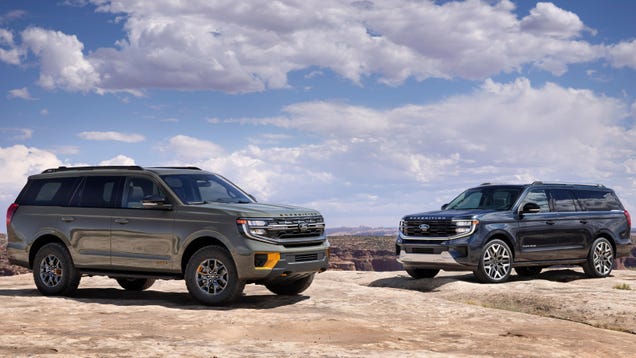The Evolution of Full-Size SUVs: A Closer Look at the Market Dynamics
Full-size body-on-frame SUVs have long been a cornerstone of the North American automotive landscape, appealing to families, adventurers, and luxury seekers alike. With models like the Chevrolet Tahoe, GMC Yukon, and Cadillac Escalade dominating the market, it’s essential to understand the factors contributing to their popularity, as well as the emerging competition from brands like Ford, particularly with the Expedition and Navigator. This article delves into the current trends, consumer preferences, and the future of this segment.
Understanding Consumer Preferences in the SUV Market
The SUV market has seen a significant shift in consumer preferences over the past decade. Buyers are increasingly looking for vehicles that offer not just space and utility, but also advanced technology, safety features, and fuel efficiency. According to a recent study by J.D. Power, 70% of SUV buyers prioritize technology integration, such as infotainment systems and driver-assistance features, over traditional attributes like towing capacity.
The Chevrolet Tahoe and GMC Yukon have capitalized on this trend by incorporating cutting-edge technology and spacious interiors. For instance, the 2025 GMC Yukon boasts a new column shifter and an array of digital displays, enhancing both functionality and user experience. These features resonate with modern consumers who seek convenience and connectivity in their vehicles.
The Luxury Appeal of Full-Size SUVs
Luxury SUVs like the Cadillac Escalade have also seen a surge in popularity, driven by a growing demographic of affluent buyers who value both status and comfort. The Escalade’s reputation for opulence is bolstered by its high-quality materials, spacious interiors, and advanced technology, making it a sought-after choice among luxury consumers. According to a report from IHS Markit, luxury SUV sales have increased by 25% over the past five years, indicating a robust demand for high-end models.
Moreover, the introduction of electric variants, such as the upcoming Cadillac Escalade IQ, reflects the industry’s pivot towards sustainability without compromising luxury. This move aligns with consumer expectations for eco-friendly options, showcasing how traditional SUV manufacturers are adapting to changing market dynamics.
The Competitive Landscape: Ford’s Response
While General Motors has maintained a stronghold on the full-size SUV market, Ford is not standing still. The recent reveal of the next-generation Lincoln Navigator and the anticipated 2025 Ford Expedition highlight Ford’s commitment to innovation and competition. The Navigator, often viewed as a direct competitor to the Escalade, emphasizes luxury and comfort, while the Expedition is focusing on enhanced technology and performance.
Ford’s strategy includes the introduction of more screens and advanced infotainment systems in the 2025 Expedition, aiming to attract tech-savvy consumers. Additionally, rumors of a potential Expedition Raptor variant suggest that Ford is looking to capture the adventurous segment of the market, appealing to buyers who desire both capability and style.
Safety Considerations in the Full-Size SUV Segment
Safety remains a paramount concern for SUV buyers, particularly families. Recent discussions have raised questions about the safety of larger SUVs compared to their midsize counterparts. A study by the Insurance Institute for Highway Safety (IIHS) indicates that while larger SUVs generally perform well in crash tests, their size can lead to a false sense of security among drivers.
As manufacturers continue to innovate, integrating advanced safety features such as automatic emergency braking, lane-keeping assist, and adaptive cruise control is becoming standard practice. The 2025 models from both GM and Ford are expected to incorporate these technologies, addressing consumer concerns and enhancing overall safety ratings.
The Future of Full-Size SUVs: Trends to Watch
As we look ahead, several trends are likely to shape the future of full-size SUVs. The shift towards electrification is perhaps the most significant, with manufacturers investing heavily in electric vehicle (EV) technology. This transition not only meets consumer demand for greener options but also aligns with global emissions regulations.
Furthermore, the integration of artificial intelligence and smart technology will continue to redefine the driving experience. Features such as voice recognition, personalized settings, and predictive maintenance are set to become standard in upcoming models, enhancing convenience and user engagement.
In addition, the demand for customization and personalization is on the rise. Consumers are increasingly seeking vehicles that reflect their individual tastes and lifestyles, prompting manufacturers to offer more bespoke options and packages.
Navigating the Changing Landscape
In conclusion, the full-size SUV market is undergoing a transformation driven by evolving consumer preferences, technological advancements, and competitive pressures. Brands like Chevrolet, GMC, and Cadillac are well-positioned to maintain their dominance, but Ford’s strategic innovations indicate that the race is far from over. As manufacturers continue to adapt to the changing landscape, consumers can expect a diverse array of options that cater to their needs for safety, luxury, and sustainability in the years to come.

